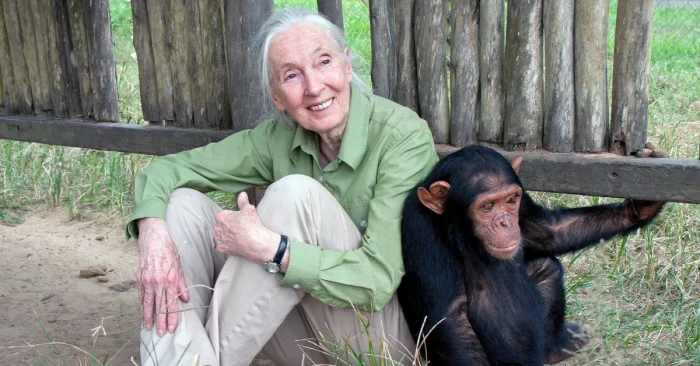Jane Goodall – Biography
Early Life and Education
Jane Goodall was born on April 3, 1934, in London, England. From a young age, she showed a keen interest in animals and nature, often spending hours observing animals in her backyard. Her curiosity and love for wildlife led her to dream of going to Africa. Despite not having a formal scientific background initially, she worked hard to pursue her passion. Goodall studied secretarial work and held various jobs before she had the opportunity to travel to Kenya in 1957. There, she met the famed anthropologist Louis Leakey, who recognized her potential and recruited her to study chimpanzees. Leakey later helped arrange funding and encouraged her to study ethology, eventually leading her to earn a Ph.D. in ethology from the University of Cambridge, making her one of the few individuals to do so without a prior undergraduate degree.
Research and Work with Chimpanzees
In 1960, Jane Goodall began her groundbreaking fieldwork at Gombe Stream National Park in Tanzania. Without formal scientific training, she used patient observation and nontraditional methods, which allowed her to form close connections with the chimpanzees. Her most notable discovery was that chimpanzees use tools—previously considered a trait unique to humans. She observed them stripping leaves from twigs to extract termites from mounds, reshaping the definition of humanity in scientific circles. Her findings challenged established beliefs and earned her international recognition. Goodall emphasized the importance of naming the animals she studied and treating them as individuals, a perspective that was controversial at the time but has since influenced animal behavior research significantly.
Conservation and Advocacy
As the years passed, Goodall became increasingly aware of the threats facing chimpanzees, including habitat destruction, poaching, and disease. In response, she transitioned from a field researcher to a global advocate for conservation. In 1977, she founded the Jane Goodall Institute, which focuses on wildlife research, conservation, and education. The institute supports community-centered conservation programs in Africa and beyond. Additionally, she launched the Roots & Shoots program in 1991, aimed at empowering young people around the world to work on environmental, conservation, and humanitarian issues. Through these efforts, Goodall has inspired generations to take action for the planet and its creatures.
Books and Media Contributions
Jane Goodall has written extensively about her experiences and scientific work. Some of her most popular books include “In the Shadow of Man,” “Reason for Hope,” and “The Chimpanzees of Gombe.” Her writing combines detailed observation with a compassionate perspective, making her work accessible and inspiring to a broad audience. She has also been featured in numerous documentaries and interviews, further increasing public awareness of animal behavior and environmental conservation. Goodall’s ability to communicate complex scientific ideas with empathy and clarity has made her a respected voice in science and activism.
Honors and Global Recognition
Over her decades-long career, Goodall has received numerous awards and honors. She was named a UN Messenger of Peace in 2002 and has received honorary doctorates from more than 40 universities worldwide. Her work has been recognized with prestigious awards such as the Kyoto Prize, the Tyler Prize for Environmental Achievement, and the Templeton Prize. Despite her many accolades, she remains grounded and focused on her mission. She continues to travel the globe, delivering lectures and promoting environmental awareness even into her later years.
Personal Life and Legacy
Jane Goodall was briefly married to photographer Hugo van Lawick, with whom she had a son named Hugo. Though her personal life has remained mostly private, she often emphasizes the importance of family and connection, not just among humans but among all living beings. Her legacy is one of compassion, curiosity, and dedication. She has redefined how scientists interact with the natural world and has shown that science and empathy can coexist. Her work continues to influence conservation efforts and animal research globally.
Frequently Asked Questions
What is Jane Goodall best known for?
Jane Goodall is best known for her pioneering research on wild chimpanzees in Tanzania and her discovery that they use tools.
Where did Jane Goodall conduct her research?
She conducted her research primarily in Gombe Stream National Park, located in Tanzania.
What organization did Jane Goodall found?
She founded the Jane Goodall Institute in 1977 to support conservation and animal welfare efforts.
What is the Roots & Shoots program?
Roots & Shoots is a global youth program launched by Goodall that encourages young people to engage in environmental and humanitarian projects.
Has Jane Goodall received any major awards?
Yes, she has received numerous honors, including the Kyoto Prize, the Templeton Prize, and the title of UN Messenger of Peace.






